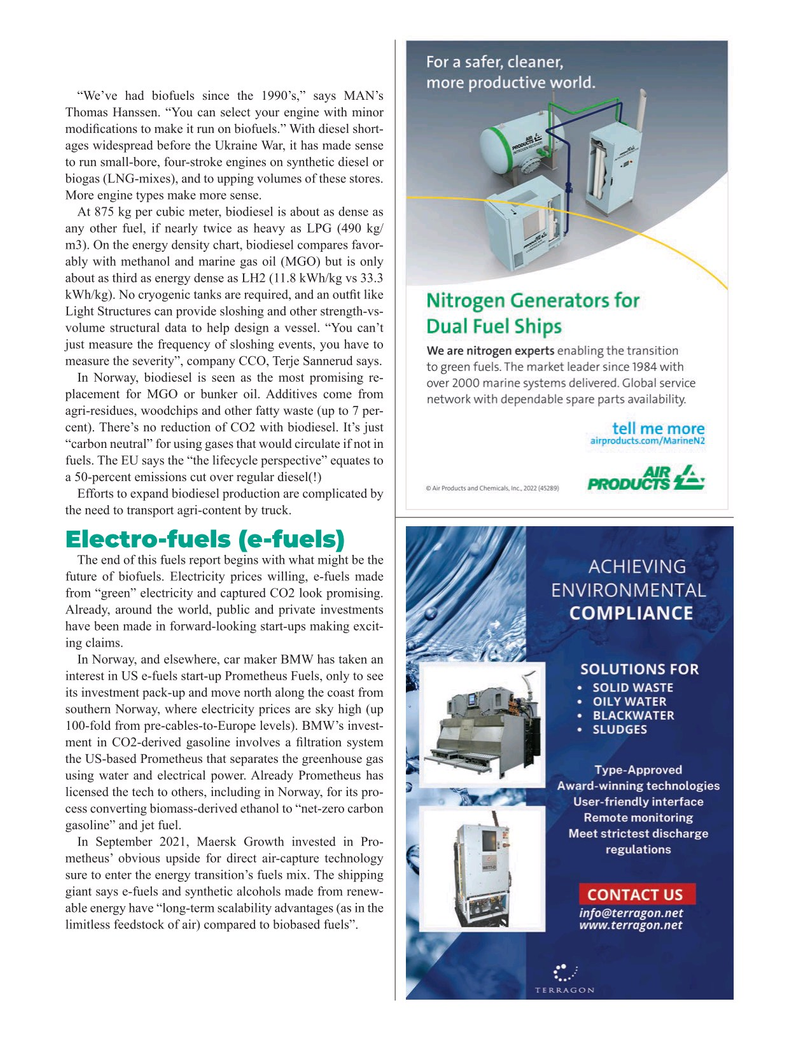
Page 33: of Maritime Reporter Magazine (May 2022)
Green Ship Technologies
Read this page in Pdf, Flash or Html5 edition of May 2022 Maritime Reporter Magazine
“We’ve had biofuels since the 1990’s,” says MAN’s
Thomas Hanssen. “You can select your engine with minor modi? cations to make it run on biofuels.” With diesel short- ages widespread before the Ukraine War, it has made sense to run small-bore, four-stroke engines on synthetic diesel or biogas (LNG-mixes), and to upping volumes of these stores.
More engine types make more sense.
At 875 kg per cubic meter, biodiesel is about as dense as any other fuel, if nearly twice as heavy as LPG (490 kg/ m3). On the energy density chart, biodiesel compares favor- ably with methanol and marine gas oil (MGO) but is only about as third as energy dense as LH2 (11.8 kWh/kg vs 33.3 kWh/kg). No cryogenic tanks are required, and an out? t like
Light Structures can provide sloshing and other strength-vs- volume structural data to help design a vessel. “You can’t just measure the frequency of sloshing events, you have to measure the severity”, company CCO, Terje Sannerud says.
In Norway, biodiesel is seen as the most promising re- placement for MGO or bunker oil. Additives come from agri-residues, woodchips and other fatty waste (up to 7 per- cent). There’s no reduction of CO2 with biodiesel. It’s just “carbon neutral” for using gases that would circulate if not in fuels. The EU says the “the lifecycle perspective” equates to a 50-percent emissions cut over regular diesel(!)
Efforts to expand biodiesel production are complicated by the need to transport agri-content by truck.
Electro-fuels (e-fuels)
The end of this fuels report begins with what might be the future of biofuels. Electricity prices willing, e-fuels made from “green” electricity and captured CO2 look promising.
Already, around the world, public and private investments have been made in forward-looking start-ups making excit- ing claims.
In Norway, and elsewhere, car maker BMW has taken an interest in US e-fuels start-up Prometheus Fuels, only to see its investment pack-up and move north along the coast from southern Norway, where electricity prices are sky high (up 100-fold from pre-cables-to-Europe levels). BMW’s invest- ment in CO2-derived gasoline involves a ? ltration system the US-based Prometheus that separates the greenhouse gas using water and electrical power. Already Prometheus has licensed the tech to others, including in Norway, for its pro- cess converting biomass-derived ethanol to “net-zero carbon gasoline” and jet fuel.
In September 2021, Maersk Growth invested in Pro- metheus’ obvious upside for direct air-capture technology sure to enter the energy transition’s fuels mix. The shipping giant says e-fuels and synthetic alcohols made from renew- able energy have “long-term scalability advantages (as in the limitless feedstock of air) compared to biobased fuels”.
MR #5 (18-33).indd 33 5/4/2022 11:52:59 AM

 32
32

 34
34
